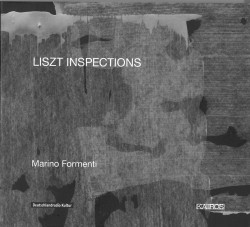 Liszt Inspections
Liszt Inspections
Marino Formenti
Kairos 0013292KAI
The magician of the keyboard, Franz Liszt started early and lived a long life playing, composing and experimenting. His son-in-law Wagner already blew apart traditional harmonies with Tristan, but Liszt introduced atonality for the first time (see Faust Symphony, first movement). Atonality of course later became the cornerstone of the Second Viennese School of Schoenberg, Webern and Berg and also the starting point of Italian pianist and conductor Mario Formenti’s remarkable journey: Liszt Inspections.
Formenti selects over a dozen of Liszt’s less familiar pieces, played so sensitively that those alone would make this an attractive set to have, but that’s not his purpose at all. Instead he looks into various aspects (he calls it Vocabulary) of music common to both Liszt and a number of avant-garde composers and builds a well-argued thesis unearthing and proving these relationships. Each of the Liszt compositions illustrates one point of the Vocabulary (e.g. constructivism, sound, minimalism, death, remembering-forgetting, elimination of the metre, silence and more) and by this process he achieves two things: 1) proving Liszt’s genius and his vision into the future and 2) bringing a number of contemporary pieces into focus highlighting them so the average listener who’d otherwise willfully reject new music, is enticed to listen. I am willing to bet that the next time any of these composers’ music is played he will do so with interest. There are at least a dozen composers, like Adams, Berio, Kurtág, Ligeti, Rihm, Stockhausen etc., each with his own unique style that up to now I had considered so much noise and hogwash. In the shining light of Liszt these begin to shine as well. Nice achievement for Signor Formenti.



